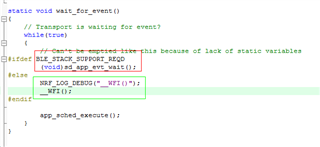More of a suggestion than a question:
Using the info available on the infoCenter, especially here and here, I'm trying to implement a way to dynamically select the DFU transport to be used. I was able to build my project without breaking the DFU over BLE functionality; I don't have a way to test the UART yet. My suggestion is changing the identifier "dfu_trans" in one or both of nrf_ble_dfu.c and nrf_uart_dfu.c. The fact that both files were using the same identifier caused build errors in my Segger Studio setup. It doesn't seem like there is any reason for them to share that identifier. So, I changed them to "sdfu_trans" and "bdfu_trans" and was able to build and run.
Another suggestion, more of a request really - it would be nice to be able to select, or simply init and uninit transports from outside the DFU and bootloader libraries. Thanks.
I'm working on a custom board based on the nRF52832. I'm developing on Win 8.1 using SES and a J-Link Plus. SDK version 14.1.



